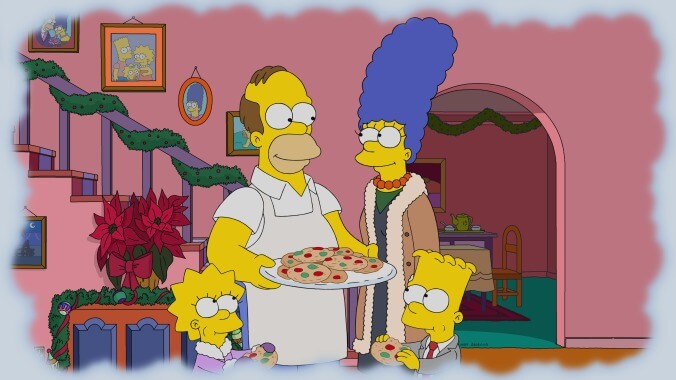There are stories that move you on their own, and stories that tell you how moved you should be, counting on cues and tradition to do the work. “Manger Things,” The Simpsons’ impossible 700th episode, does everything to mark its place in history but give us a reason to celebrate it. As a piece of TV history, it’s a novelty. As an episode of The Simpsons, it’s barely there at all.
But we are not here to reminisce on the occasion of a nice, round-numbered episode, we are here to talk “Manger Things.” And “Manger Things” barely registers.
Rob LaZebnik is the credited writer, and his name is one I generally look on with hope at the start of an episode. The Simpsons is a crisply run ship by this point, with everything looking sharp, and our voice cast overcoming the remote-recorded COVID process with nary a hiccup. I laughed once for real, on the throwaway gag where Mr. Burns’ cozy assurance that his employee Christmas party is brimming with goodwill is belied by a random bullet clanging off of the power plant railing in front of him. It’s a old joke, but it’s pulled off well and I laughed.
Flanders—whose role in this terminally unfocused episode is otherwise improbably disposable—brings up Jesus’ whole “Love your neighbor” idea to convince the very flashback-pregnant Maude to allow the tossed-out Homer to share their holidays, while musing how the Guy “never seems to live next to anyone.” And Homer, spending the night in Flanders’ “Son of Man cave,” is momentarily tempted by a Bosch-esque painted devil, responding to the little monster’s talk of the lake of fire by immediately sparking, “A house by the lake? I could get some writing done!” I’m always on board for a joke about the unexplored and unexpected corners of the mind of Homer J. Simpson.
That’s not a lot of entertainment to hang any episode on, however. And “Manger Things” throws a whole lot of logs on the fire to try and generate some “700th episode spectacular” heat. It’s a Christmas episode. It’s a flashback episode. Marge throws Homer out. It’s a Flanders episode. Homer plays emergency doula for Rod’s birth, for crying out loud, a monumental retcon that brings Homer and Maude into such unexpectedly profound intimacy that it makes Homer’s infamously callous reaction to his inadvertent killing of Maude that much more lousy in retrospect.
It’s sort of shocking, even for a professionally jaded Simpsons viewer, how little nurturing is done for any of these plotlines. The Christmas angle exists to pile on to Homer’s sadness at Marge’s decision to give him the boot (and to make sure Neddy is out delivering Christmas turkeys to the needy during Maude’s time of need), but it could have been set any time. (If there’s a symmetry to episodes 1 and 700 both being set during the holidays, that’s all there is to it.) Homer, after being clued in to a secret room over the Simpson garage by Moe (for some reason), winds up camping out there and spying on his family through a conveniently sound-conducting vent. But while Dan Castellaneta dutifully supplies the heartsick Homer with plenty of mournful moans and sighs over his predicament, the central conflict between the couple isn’t dramatized so much as manufactured. Homer making a Clark Griswold-style solo Christmas nest in the cramped and forgotten attic space feints toward pathos without ever committing, and it’s all so terribly flat and uninvolving. Plus, as Season 32 fanatics know, Marge threw Homer out just a few episodes ago, so not only is her decision here portrayed as misguided (Lenny and Carl secretly got the reluctantly abstemious Homer drunk at the party), that narrative bullet shouldn’t be shot off willy-nilly.
Similarly, there’s no real comic hay made from the six-years-prior flashback premise. Homer has a little more hair. So does Abe, who, in this version of history, was under the illusion that he’d be able to live with his son’s family indefinitely. We get that long-debated backstory about just why Marge had to replace those kitchen curtains, for those into that sort of thing. Bart (age 4) and Lisa (age 2) are little ciphers, Nancy Cartwright and Yeardley Smith pitching up their characters’ voices a bit, but the siblings otherwise act identically in response to Homer’s sudden absence. There’s a wheeze of an effort to suggest that Bart’s li’l bastard tendencies stem (this time) from his brief fatherlessness, but, like the rest of the character beats in “Manger Things,” it hardly exists. And when the climax sputters out with Maude’s Homer-assisted childbirth, Ned and Marge’s arrivals are as artless and perfunctory as such things get. (There is literally no reason given as to why Marge is suddenly in the Flanders home to witness Homer’s convenient helpfulness.)
In the promotional materials leading up to the big 700, “Manger Things” was sold with the idea that Homer would find an unknown room in the Simpsons’ home. That’s the kernel of an evocative idea, metaphorically promising there still being something hidden and wonderful, even in something you imagine has run out of ways to surprise you. “Manger Things” barely explores the, as it turns out, completely unremarkable attic space in the family’s garage, squandering hopes I allowed myself to raise as I was allowed to dip back into The Simpsons (professionally speaking). 700 episodes and 32 years is an eternity in television. Hell, it’s a long time for anything, or anyone. Congratulations are due, even if another big round number is as artificial a milestone as ever, so congratulations to one of my favorite shows ever. And, as ever, here’s to next week being better.
Stray observations
- Apart from Marge being cast as the (unintentional) villain of the piece here, Maude is also awfully snippy and un-Christian/un-Flanders throughout. She’s not wrong—Homer eats the Flanders’ uncooked, still-wrapped Christmas ham for a midnight snack—but her characterization here is just one big, sour bummer.
- It’s also uncharacteristic of Marge to tell the kids that what she needs for Homer to win his way back into her good graces is, “one great thing—one great thing to prove that all the nonsense that I put up with has a point.” As a rule, yeah, such episode-ending grandiose schemes are what bring the Simpsons’ marriage back from that week’s brink, but Marge isn’t one to articulate that so explicitly. In the couple’s dynamic, Homer is the one who thinks that grand gestures can fix a lifetime of grinding neglect and disappointment, while Marge succumbs because she recognizes that such shenanigans are all her loving but flawed husband can muster. Marge doesn’t want gestures, and the writing here betrays the character in a truly dispiriting way.
- Bill Plympton returns with the show-opener, “Homer’s Family,” his seventh guest animator couch gag. I agree with Sam Barsanti’s take that the hand-drawn flight of cartoon fancy is sort of sweet, in its way. The piece re-centers Homer as the heart of the show, his smiling countenance never changing even as pieces of him erupt (there’s always an element of body horror with Plympton) and then float around his noggin, Marge and the kids eternally bound to their Homer-centric orbits through force of love, and sitcom tradition. That Homer is irrevocably transformed through this Cronenberg-ian subtraction and yet uncomplainingly chooses to submerge himself in this new reality of wife, children, and 32 years of stasis, is more a thoughtful and insightful a rumination on The Simpsons than anything actually in “Manger Things,” an affectionately poetic and inventive riff on a subject whose weekly reality has become, too often, rote and mundane.
- Thanks for overanalyzing The Simpsons one more time, you kooks. It’s nice to be back, if only for a visit.


 Keep scrolling for more great stories.
Keep scrolling for more great stories.
